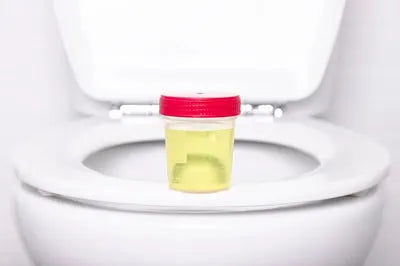Just like how abs are made in the kitchen, a healthy bladder is made in the kitchen too. Because, after all, you are what you eat – and what you don’t. If you’re wondering how to keep your bladder fit and healthy and looking for ways to make your diet bladder-friendly, you’ve come to the right place friend. Keep reading!
Importance of a Balanced Diet and Lifestyle for Overall Urinary Health
The bladder is a balloon like organ that holds on to urine until it’s expelled from your body. To do this, it works hand-in-hand with your kidneys, which filters fluids and wastes from the bloodstream, resulting in the by-product we all call urine. So, of course, when your bladder isn’t doing a good job with this by-product inside it, it’s going to lead to a number of problems. And that’s why it's essential for us to do our best in keeping our bladder happy by focusing on what we can actually influence – our diet and lifestyle. We'll exclusively concentrate on the diet in this blog post. Let’s move ahead!
Key Nutrients and Their Role in Supporting Bladder Health
These are the nutrients that are most beneficial for your bladder – meaning, the nutrients you MUST include in your diet for a healthy bladder. The best thing about these nutrients though is that you don’t have to go out of your way to include these nutrients in your diet, you just need to make your plate a little more colourful. Without much further ado, the key nutrients your bladder just loves:
-
Fibre: A diet rich in fibre contributes to healthy digestion and can prevent constipation, which is known to put extra pressure on the bladder. Fruits, vegetables, whole grains, and legumes are excellent sources of fibre and should be included in daily meals.
-
Antioxidants:Antioxidants play a crucial role in protecting the body from oxidative stress, which can damage cells and tissues. Foods high in antioxidants, such as berries, and leafy greens, can help maintain a healthy bladder by supporting cellular health.
-
Vitamins: Vitamins like vitamin C and vitamin A are important for bladder health. Vitamin C, commonly found in berries and leafy vegetables helps to maintain the acidic environment of the bladder, making it less hospitable to harmful bacteria. Now, a quick google search will show you that citrus fruits are the best source of vitamin A but avoid citrus fruits as it’s one of the foods that irritate the bladder. Vitamin A, present in foods like sweet potatoes and carrots, supports the delicate bladder lining.
-
Minerals: Minerals like potassium and magnesium are essential for overall urinary health. Potassium helps in managing fluid balance in the body, reducing the risk of kidney stones and supporting bladder function. Bananas, potatoes, and spinach are great sources of potassium. Magnesium plays a role in muscle function and can help maintain healthy bladder control. Include foods like nuts, seeds, and whole grains to boost magnesium intake.
-
Probiotics: Probiotics promote a healthy gut, which, in turn, can positively influence urinary health by reducing the risk of urinary tract infections (UTIs). Yogurt and fermented foods are rich in probiotics.
Related Article: Seven Tips to Get Your Bladder Under Control
Exploring Bladder-friendly Foods and Their Benefits
Here's the best foods for your bladder:
-
Garlic: Let’s start with the smelly one with a whole arsenal of health benefits. Garlic is an effective treatment for digestion issues, infections, parasites, and even fatigue and low energy issues. It’s also a great way to keep kidney infections and bladder cancer away. Thankfully, garlic is an important part of Indian diet so there wouldn’t be any trouble getting some garlic in.
-
Bananas: Go bananas for bananas! Bananas are rich in fibre and potassium that can be good for your bladder and urinary tract health. They’re a great snack, easy to add to a smoothie, or a great topping for your morning yogurt. All around a very chill addition to your diet.
-
Berries: Berries, especially blueberries, have the highest amount of antioxidants amongst fruits and veggies. They are also a great source of fibre, and vitamin C, vitamin K, and many other nutrients which may help prevent UTIs, making it one of the best fruits for urine infection. Berries are great when eaten fresh, frozen, or even dried, and can be added to yogurt, smoothies, salads, and other delicious recipes.
-
Nuts: Nuts are protein and fibre-rich foods, but we must choose our nuts carefully as some nuts can irritate the bladder. So, for the best, stick to almonds, cashews, and peanuts, and avoid heavily-salted nuts.
-
Cruciferous Vegetables: Cruciferous vegetables, which include cauliflower, broccoli, cabbage, radish, etc. are some of the healthiest types of vegetables due to their cancer-fighting properties. These vegetables are filled with vitamins C, E, K, and plenty of other nutrients, making it one of the best foods for bladder health.
-
Eggs: Eggs are another great source of protein, vitamins, iron, minerals, and many other important nutrients. Eggs are also one of the least bothersome foods you can find for many bladder conditions.
Now eating for a healthy bladder doesn’t have to be boring. By adding a wide variety of nutritious foods to your diet, you’ll actually find yourself with more energy, fewer problems, and an overall healthier you. If you experience any problems with your bladder or urination or any symptoms that raise concern, the first and best course of action is to book an appointment with your doctor. If you need more diet recommendations for a bladder-friendly diet, then we’re here too! See you in another blog
Related Article: 10 Home Remedies for Urinary Tract Infections (UTIs) You Should Know!
FAQs:
Does B12 help bladder control?
Vitamin B12 does not directly impact bladder control. However, vitamin B12 plays a crucial role in maintaining the health of nerves, including those that control the bladder. Nerve health is essential for proper bladder function, and a deficiency in vitamin B12 can lead to neurological issues, which might indirectly affect bladder control.
Is dairy good or bad for bladder health?
Dairy can have mixed effects on bladder health, as it depends on the individual. Some people may find that certain dairy products irritate their bladder and worsen symptoms like urgency or frequency to urinate. In such cases, it's best to avoid or limit dairy intake. Common bladder irritants in dairy include high-fat cheese, yogurt with added sugars, and chocolate (made from milk). However, many people can tolerate dairy products without any issues and can include them as part of a balanced diet.
















